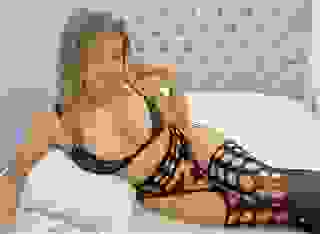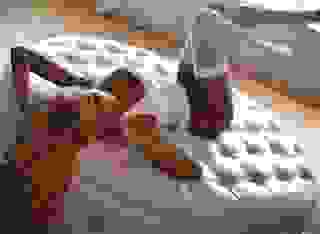Note: You can change font size, font face, and turn on dark mode by clicking the "A" icon tab in the Story Info Box.
You can temporarily switch back to a Classic Literotica® experience during our ongoing public Beta testing. Please consider leaving feedback on issues you experience or suggest improvements.
Click herePart of my growing up was the realisation that she lied to me non-stop. Everyday... Everyday! I would head for the front door on my way to school, and she would grab me for a hug and a kiss, and tell me I was her beautiful boy. Over her shoulder, in the full-length hall mirror, I could see the back of her, and parts of me hanging out on each side of her. How could she possibly consider me beautiful?
Of course, I was miserable from the time I woke up to the time I fell asleep -- sometimes halfway through a snack. Because inevitably, the fatter I got, the more miserable I became -- and the more unhappy I became, the more I would turn to food to try and find even the smallest measure of pleasure I craved in my bleak life.
By thirteen I'd turned completely inward, staying silent unless absolutely compelled to say something to someone at school. I still needed to release my inner voice somewhere, anywhere, so I began to write poetry -- which was awful, and then songs -- which were better. I loved writing those. Somehow, when I wrote the words down, I would hear voices singing the tune behind them -- clear and pure and clean in my head. They were usually women's voices, and I sometimes wondered about those women, but allowed that they were probably muses. Those were the easiest to remember, and I'd carefully pick out the notes on my guitar. After a while, all I needed was a trusty hound, and I could have been a tramp and busked for food -- although I would have needed to busk 24/7 in order to keep me fed. I don't know how the dog would have survived.
I was solitary, so I turned to my second great love; my little magic box, which sat on my desk and hummed quietly to itself 24 hours a day, no matter what Dad said about his electric bill. I'd discovered that most computer equipment failures happened during the powering up and down stages, so the hell with doing that! It was too valuable to me. I mean, who wants to lose their one and only friend just because of a few pennies on an electric bill?
Being a loner, of course I got into every aspect of programming. I mean, I was truly alone but for my sister, and she could only stand having a boy around her for limited periods at that stage of her life. Besides, what else was I going to do -- nip out for a game of football, or do a few laps at the local swimming baths? I could have been effective as a goalkeeper, the opposition would probably never have the space to squeeze the ball past me, as I probably could have filled that goal from side to side. In the pool, I stood a good chance of being harpooned. I was sentenced to the worst of nerd lives.
To combine my two hobbies, I wrote a program. I ran it and tried singing and playing one of my compositions to my electronic friend. Dissatisfied, I tried again, and the program got bigger and bigger as I rewrote the code three more times, importing and adapting free code posted online by other programmers. The next time I played my guitar to it -- as badly as ever -- it faithfully recorded the sound and then allowed me to alter just about everything about it until my playing sounded almost as good as Knopfler, Page, either of the Hawkins, or Santana -- and I was still trying to step it up to try and get even near to Hendrix. I kept at it and added whole sections to the program to allow me to artificially add other instruments; strings, brass, percussion -- pretty much anything I wanted.
I became a keyboard player -- even if it was only a computer keyboard. I kept improving the program, spending days writing and rewriting code, and even more time with headphones clamped on tight, playing and perfecting music I'd composed.
It was around my sixteenth birthday that I finally accepted that with my voice, I was never going to make it as a singer. Britain's Got Talent would just have to eat its heart out when I didn't turn up to audition. I was a bit sad about that: I'd seen a video of a duo called Jonathon and Charlotte on that programme and if he'd had a lot less hair, a couple of pounds more fat, and a much worse voice -- he could have been me. She was hot! If he could get together with a girl like that with just his voice, perhaps even I could. That is, except for one thing: his voice could grace any opera hall in the world and mine sounded more like a goose farting in a colander.
I had needs! Basically, I just really, really wanted to be with a girl I wasn't related to at some stage -- just to see what they actually felt like, even in a non-sexual way. I had the idea that they probably felt smooth and soft underneath those clothes. I knew most of them were pretty and all of them were mostly mean, but they usually smelt really good -- I knew that as my sister had friends who would call round, although I would hibernate in my room whenever they did to try and avoid offence.
I was writing songs that I would never sing, until one Sunday morning, I woke up with a strange notion rattling around in my head. I watched a whole lot of YouTube videos that day to get things right in my mind, and carefully rewrote one of my songs, changing the key and the tempo. I added a few cellos and a marimba to the opening backing track, and then recorded it, adding full orchestral background to the chorus and adjusting the words to fit the need as I went along.
On Monday I posted a CD and an accompanying letter through the local letter box on the way to school, and settled down to my miserable life once more.
I know now that it was an idiotic thing to do. It was never going to be heard. Not a chance in a million would anyone take any notice of a CD from an unknown source.
It turned out I was number one million and one.
I discovered later that the secretary whose job it was to open unwanted mail and chuck it in the bin, misread my odd name and confused me with Greg Lake of Emerson, Lake and Palmer. With him in mind, she listened to the CD and then forwarded it to the music editor whose job it was to evaluate new possibilities. The secretary had done her research and attached a memo, noting that she thought it was a decent ballad, and that Greg Lake had had success writing some pretty good songs in the past, after he separated from ELP. She'd also noted the recommendation in my letter as to whom the song was designed and written for. The editor took a listen and agreed, forwarding the CD on to Robbie Williams' agents. They listened to it in turn, realised that it was a good fit for him and -- with the now-absent Gary Barlow being the main song-writing contributor to most of Take That's hits -- decided that my composition might help keep his solo career at the top of the hit parade, or at least out there and being taken seriously.
It turns out that it was the accounts department who first discovered the error. They had gone back and checked my letter to confirm the address of Greg Lake's agent, so they could send out the standard contract and a cheque to lock it down. That's when the shit hit the fan -- of a jet engine! Who the fuck was this Bryn Lake guy?
They'd already spent a whole lot of money and time on studios, musicians and backup singers, as well as engineers and a producer. Hell, the music video was almost completed -- and the budget for that was already spent!
The studio, the label reps and Mr Williams' agency got together in a panic for an emergency meeting. They'd spent all this money on the assumption that they were operating under a standard music agency agreement with someone they had worked with before -- even if it was a long time ago. Now they had to talk to some unknown wild card, without even a contract signed. Of course, it didn't help that Robbie liked the song and didn't want to discard it. The label had signed him in the biggest music deal ever seen in Britain up until then, and knew they would have to treat him with kid gloves for a while until they got their investment back. The blame went round and around that meeting table a couple of dozen times, before they gingerly decided to go with it and see what came out the other end.
When I got a contract in the post a few months later -- at best expecting an automatic rejection slip of some sort -- read it, and eventually woke up again, I turned to my electronic friend for advice. In the end, online research led me to phone a Mr Paul 'Call-me-Lappies' Labuschagne and ask him to represent me in the matter. Once he understood what I was saying and that there was already a contract out there for me to sign and -- even better -- that no further effort was required from him on my behalf to get it sold, he set aside his disbelief and became really enthusiastic about adding me to the string of songwriters and musicians on his books.
Lappies was a South African ex-pat, who had moved to Britain in the nineties and started up a small, but very effective agency. Initially, he signed up everyone that had a shred of talent in the entertainment industry, but quickly refined it to music -- his first love -- although happy to keep representing those in other fields that he had already signed up. He was a big Afrikaner with a strong accent, a huge smile and the ability to get people to like him very quickly. Behind the smile, he was intelligent, trustworthy, honourable and very, very crafty. His business quickly became successful.
I signed with him, although I didn't sign that particular contract with the record label in the end. Lappies had a meeting with them and -- having discovered through contacts that the song was all done and dusted, part of an album ready to ship out and hit the music stores and internet within the week -- he basically sneered at their contract and settled down to negotiate something far better for the two of us.
I signed a better contract, instead. For him it was a cut of a higher percentage. For me, it was my name as sole writer on a song which quickly climbed up the hit parade. I didn't get paid an option, and had to wait almost a year before I saw any real money, but then the automatic royalties system kicked in and cheques rolled in regularly each month. Lappies loved it. So did I.
My sister, whom I'd sworn to secrecy on pain of death and telling everyone she still wore My Little Pony onesies to bed each night, stopped taking the mickey out of my songs and even promised me her first born if I would just introduce her to Robbie Williams. Sadly for her, I never met him -- or anyone else at his label. Unfairly, I was put on some shit list with them for several years until my folio of hit songs grew too big to ignore.
Despite their desire to broadcast the success of their strange lonely son to family and friends, my parents were sworn to secrecy, as well, much to their chagrin. They understood the reason. They could see from any newspaper they cared to read that fame tended to do weird stuff to people when it first happened, and knew that I was both too young and too locked inside myself to handle that sort of nonsense. I got to see that up-close way better than I ever wished.
I wanted to keep my songs to myself.
I'd listen to girls singing it at school, or dancing to it while sharing it on their iPods or phones, and keep a small smile of satisfaction to myself. The success of that song gave me some self-belief, self-confidence and self-awareness. Not a lot, but enough that when combined with the money I got when the royalty payments started coming in every month, it got me masses of gym time with a personal trainer and dietician. Over the next two years, I cried a lot when I was alone -- from the pain throughout my body, from exhaustion and from loneliness. However, the fat melted away to be replaced by a modicum of muscle, and when the trainer finally gave me a nod of respect, I was ready for university and a degree in computer sciences -- although I was still not really ready for girls.
¬¬¬*****¬¬¬
Take the burden
Carry the weight
Dodging the eye
Away from the light
Make it work hard
Keep it sightless of fate
Pay it dear and precious
Always, (always, always) out of that sight
Rings (B. Lake) 2005
¬¬¬*****¬¬¬
Zero hour +1
Summer and I were lost in a crossword. At least that's how it felt. Intersections would appear every couple of miles, forming a never-ending grid of regimented crops with no sign of civilisation on either side. I guessed that even wheat needed roads to get to mills, feed stores and bakeries, but I couldn't swear to it as there was no sign of any of those as we drove on and on.
Summer, or more correctly Charlotte, had lapsed into a sullen silence after I regaled her with the story of how I first got a date with Phoebe; her hearing me working on a song in the woods, stopping to chat -- and to my astonishment, admiring my work. I had persuaded her to sing along and recorded her voice, and as a reward promised her pizza. I'd stopped at that point -- getting lost in memory.
More worryingly than Summer's attitude, I realised that she was sliding her butt forward and slumping down in the seat whenever a car or truck came towards us. When on one occasion we were overtaken, she slid off the seat altogether to crouch in the footwell. I raised one eyebrow and she scowled up at me, her lips screwed up tightly into a little bud that looked alarmingly kissable. As the truck breezed past us, I saw what seemed to me to be a very ordinary man, wearing a checked shirt and a cowboy hat. He glanced over and then concentrated on his driving.
When I described him to Summer, she seemed relieved, but refused to say who she was watching out for, turning her head away and looking out of the window, keeping her thoughts to herself. For a while I thought about how she refused to tell me who was chasing her, and the words in my head seemed to flow like tributaries of a river. As the scenery slowly rolled past, they all came together into a delta to form the song that would eventually become Chasing the Fast Road.
Aiding the composition of that was the fact that we were travelling on what I would normally consider a gravel road -- a farm road -- a seemingly infinite off-white path that simply went straight for mile after mile, crunching under the tyres as it unwound in a continually direct uniform strip. I kept the speed down to thirty miles an hour, all too used to the sudden inexplicable bends that appeared in British roads solely to challenge a driver's skill at getting around a corner while going too fast. I didn't want to face that on a surface made of stones kept together only by the force of gravity, but other drivers seemed to regard it as perfectly normal, sweeping past us at much greater speeds.
Gravel seemed to be fairly standard for the area, and little heaps of grit appeared on the verge from time to time, probably for top up or repair purposes. One of my main concerns was that this would turn out to be the grit that I'd been instructed to try when I visited Nashville, the next stop on the tour that Lappies' personal assistant had strung together for me: a tour of icons, musical greats, and the offices of their agents. My preferred ideal of seeing America would be from the upper deck of one of those luxury trains I'd seen in movies -- hopefully in first class -- with some excellent catering. I also wanted to see the real America behind the shadows on movie screens, so I guess it was my own fault.
Now I was here, it felt a bit weird. It was all too a bit too big for my liking, and I felt almost itchy within my skin. The whole country was too big, with too much sky. I was seated next to a pretty, albeit goblin-tempered woman, in a huge car that effortlessly swallowed every bump in the road, surrounded by wheat as far as the eye could see. This was not what I'd expected this trip to be. I missed my little corner of the world. I needed to see more people, more buildings, more hills, more rain. One day out of London, and I was already homesick.
I was also in trouble. I had the gnawing certainty that this thing with Summer, whatever it was, would turn out badly. Not for the first time in my life, I mentally swore at the part of me that forced me to remain with her. It had been bad before, but after she'd hugged me, my oh-so-wonderful syndrome was buzzing along merrily like a Japanese Shinkansen -- a bullet train -- seemingly unstoppable and moving too quickly to ever halt, or even slow down enough for me to jump off.
I sighed, and then brightened a little as houses came into view and we drove into a town... a village... a roadside camp? I had no idea what to call it. The houses were an almost uniform white with very little to differentiate between them -- apart from some having grey roofs and some red -- with huge spaces of bare land between them. Little huddles of these were gathered together here and there, and the sum of those clusters was more like a clot on the landscape than anything else I'd ever experienced.
Some had cars -- or fridges, stoves or sofas, or all of the above -- in the front and back yards; which couldn't be called gardens by even the most enthusiastic stretch of the imagination. The surrounding fields were a rich, emerald green or a bright, shining gold -- while the yards and public grassed areas were a lifeless brown. There were way more basketball hoops than the flagpoles proudly flying the Stars and Stripes that I'd been led to expect. To be honest, I couldn't help comparing it to the remnants of a gypsy camp I'd seen once, after the caravans and trailers had moved on.
More promising for Summer's empty belly were the bigger houses and neater yards that appeared a few blocks further into what turned out to be the township of Lincolnville. In the distance, I spotted the first sparse signs of life with a few people moving in and out of what was obviously some sort of trading store. My hopes were dashed once again, when I got closer and realised it sold auto parts. Okay, it was mid-afternoon and most of the residents were probably either working in the fields, or somewhere with a few more enterprises, but this looked like a ghost town.
I let out a noise of annoyance. How could anywhere with more than a dozen houses sell auto parts but not food?
"What's bugging you?" Summer asked.
"I can't find a place to eat," I complained.
"You passed a diner a few blocks back. I thought you weren't going to stop so I didn't say anything."
I cocked my head at her, askance. I sighed. "Okay, I'll turn around."
I retraced the route until she pointed out what I'd previously taken to be a double-length garage with a couple of small windows in the side. It looked very similar to some of the houses: four metal covered walls and two plain roof sections leaning against each other. It reminded me of photos of the old prefabricated houses they churned out by the thousand after the war for the hordes of returning soldiers and their families.
"That's a diner?" I asked, disappointed at the shredding of my movie-inspired expectations.
"It's not where Harry met Sally," she agreed, picking up on my dismay. "But it's food."
I parked and she fussed with the handkerchief on her head. I realised that she was making sure it covered her hair completely. Yep, she was being followed all right, and that being the case, that magical hair would draw attention like a lighthouse in the middle of Trafalgar Square. In my imagination, I placed a huge rotating lamp on the top of Nelson's head and sniggered at the incongruity.
She glared at me, and I did my best to look innocent. After a moment she sat back and looked at the diner.
"I don't have any money," she said finally.
"I kinda guessed that, I've pretty much seen everywhere a pocket might be expected."








